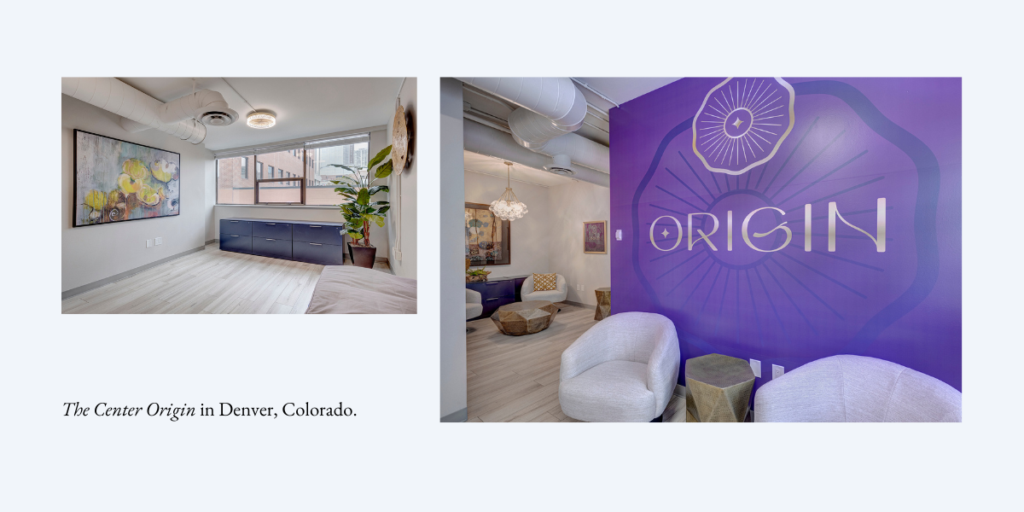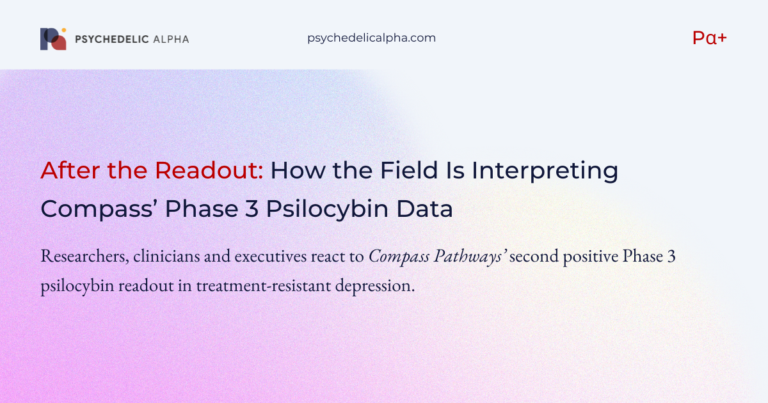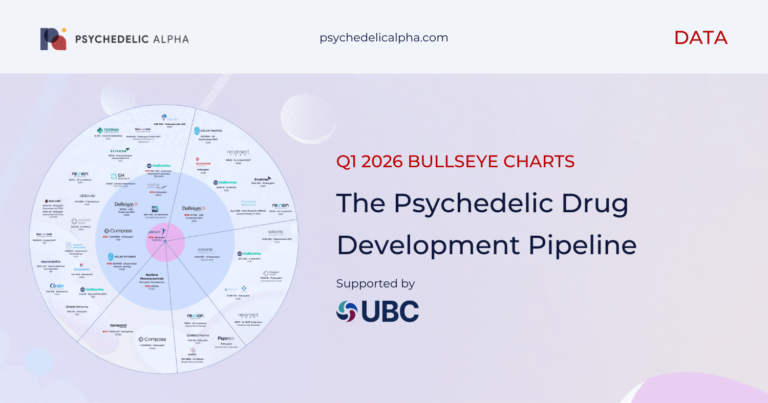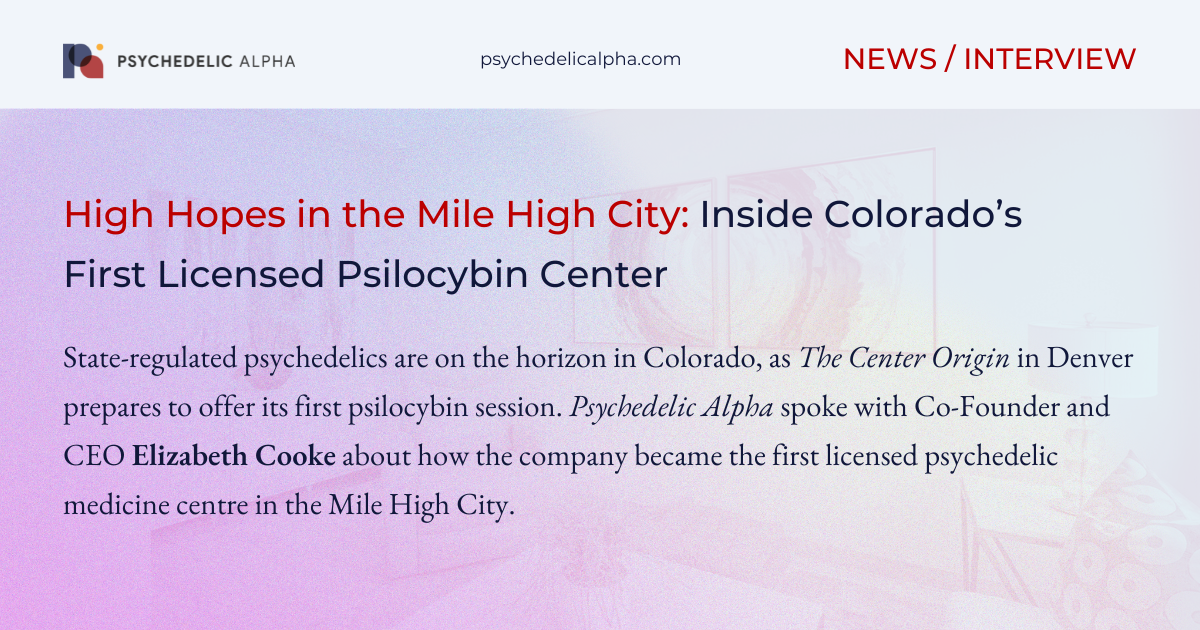State-regulated psychedelics are on the horizon in Colorado, as The Center Origin in Denver prepares to offer its first psilocybin session. Psychedelic Alpha spoke with Co-Founder and CEO Elizabeth Cooke about how the company became the first licensed psychedelic medicine centre in the Mile High City.
***
Words by Charles Bliss for Psychedelic Alpha.
Psilocybin mushrooms are still designated as Schedule 1 under United States federal law, but over the past five years more than a dozen U.S. cities have deprioritised or decriminalised psilocybin, forging the path for regulated psychedelic services at the state level.
In November 2020, Oregonians endorsed the creation of the first state-regulated legal psilocybin services system, through the passage of Measure 109. Two years later, Coloradans voted to pass Proposition 122—also known as the Natural Medicine Health Act—which created the second such system. The Act decriminalises personal use, possession, growth and transport of two compounds found in psychedelic mushrooms, psilocybin and psilocin, as well as three plant-based psychedelics, dimethyltryptamine (DMT), ibogaine and mescaline, among adults aged 21 and older. However, it remains illegal to sell the drugs in retail stores or dispensaries.
Building on the precedent set by Oregon, the original ballot proposed that, by late 2024, individuals of the requisite age should be allowed to consume psychedelic mushrooms under supervision at authorised locations. Over the past three years, the Colorado Department of Revenue (DOR) and the Department of Regulatory Agencies (DORA) have developed the necessary rules and infrastructure to implement and oversee a statewide regulated psilocybin therapy program1.
To date, the Natural Medicine Division has received applications for 21 ‘healing centre’ licenses, 11 cultivation licenses, four manufacturer licenses and one testing facility license. Only one standard license in each of the manufacturer, cultivator and healing centre categories has so far been approved, with no testing facilities online as of today.
On April 1, The Center Origin in Denver announced its official licensure as the first “psychedelic healing center” in the state of Colorado.

“We are honored to lead the way in bringing regulated psychedelic services to Colorado,” said Elizabeth Cooke, Co-Founder and CEO of The Center Origin. “This licensure represents not only a major step forward in mental health treatment and individual and community healing, but also a commitment to safety, education and responsible care for those exploring the therapeutic and transformative potential of psychedelics.”
The company’s press release said the milestone marks a “historic moment in the advancement of accessible, emerging psychedelic-assisted services”. But what is the story behind Colorado’s landmark psilocybin centre?
Origin Story
In 1984, Cooke moved from Denver to New York City, where she pursued her career as a licensed clinical social worker. She got a master’s degree in social work and trained in psychotherapy, before establishing a private mental health practice which operated for 25 years. Cooke was a “serious psychoanalyst”, but was also interested in civic engagement and wellness outreach programs, she told Psychedelic Alpha.
While working for the I Have A Dream Foundation, a not-for-profit providing social, emotional and academic support to young people, Cooke discovered a passion for designing, developing and directing community-based programs.
At the foundation, master’s students and PhD candidates would complete internships and externships at the charity’s training clinic. Cooke, who is now retired from practising psychotherapy, noticed a change in approach after the medical model was introduced to the profession in the 1990s.
“What I saw coming in at one point were students that were no longer thinking about a person holistically—or from womb to tomb, as we used to say—and trying to understand developmental arrests or conflicts that were preventing them from living a full life,” she said.
Cooke found that the next generation of counsellors were instead looking to identify “symptom clusters”—groupings of co-occurring symptoms which can be interpreted to diagnose mental health disorders, following the Diagnostic and Statistical Manual of Mental Disorders and the International Classification of Diseases.
“If you have five symptoms out of seven, now you’ve got a diagnosis—and you can write a script,” she said. “Basically, what I saw was Big Pharma.”
Cooke suggested that this approach often ignores the real roots of psychological issues, producing superficial diagnoses and treatments that suppress symptoms without solving the core problem.
“Big Pharma really took over the training,” Cooke said. “They took over the curriculum. They took over every aspect of my former profession.”
In 2010, Cooke returned to Denver and established a real estate investment company. But she still held a deep-seated belief in the “medicinal value of cannabis and plant-based therapies”.
Early Lessons in the Cannabis Business
Colorado had legalised medical marijuana in 2000 when it approved Amendment 20, but it wasn’t widely commercialised until 2009, when federal prosecutors stopped targeting users and suppliers. The policy shift triggered a dramatic uptick in the number of patients registering medical marijuana licenses with the Colorado Department of Public Health and Environment (CDPHE), increasing from approximately 5,000 in early 2009 to nearly 119,000 by 2011. Voters then approved recreational use with retail sales starting in 2014, making Colorado one of the first states to legalise marijuana for non-medical use, alongside Washington.
As the landscape shifted, Cooke founded a vertically-integrated medical marijuana business called Natural Selection in 2011. But due to a volatile, “impossible” market, she let the license expire after a few years.
In 2015, she co-founded Coda Signature, a cannabis edible manufacturing company. It sold CBD and THC infused chocolates, gummies and topical skincare products, which were stocked at 600 dispensaries across Colorado and California, according to Cooke. It soon became a $75 million company, she told us, raising $5 million in a round of Series A funding, but an influx of investors saw some drastic changes to operations.
“They bought a couple of shares from me, which was great, and then they wanted to bring in their own team,” Cooke explained. “Unfortunately, they didn’t do such a wonderful job.”
The new partners replaced the pastry chef, who had been producing the confectionery, with a food chemist.
“We lost the richness of our products,” she said. “Before it was really delicious.”
“Eventually, they bankrupt the company.” (Coda Signature was ultimately bought out by professionals in the cannabis industry and today its products are back on the shelves with the original recipes.)
Launching a Psilocybin Centre
Colorado is really at the forefront in pioneering this,” Cooke said. “And so they have to be really careful and really detailed and make sure they're doing everything right. Because if they don’t and something falls through the cracks, it's going to really be a black eye—and the whole country is watching.
Elizabeth Cooke
Cooke left her operational role at Coda Signature in 2019 and began looking into functional and psilocybin mushrooms, after it was rumoured that psychedelic-assisted therapy might soon be legalised in Colorado.
“I started really putting together: what does this look like in terms of a business?”
In 2023, she viewed a property up for sale in LoDo, the lower downtown commercial district of Denver.
“It was perfect,” she said. “It was a little rough—it hadn’t been renovated in like 1,000 years—but it was a former therapist’s office.”
Its location was also advantageous. The building was situated away from schools, daycares and recreation centres, ensuring that it met state zoning restrictions designed to limit youth exposure to cannabis and psilocybin by requiring setbacks.
“I was looking at zoning because I knew from the cannabis industry that that was going to be critical,” Cooke said. “This is an adult-use zone, so I didn’t have to worry about anything.”
She landed a seller’s financing and began to renovate the space. It was originally converted into a holistic wellness centre, offering yoga, massage, breathwork and meditation classes.
“But it wasn’t really a sustainable business,” she said. “Especially because I was really looking to get into the psychedelic-assisted services.”
Then came the long wait for the Natural Medicine License. After finally being approved in April 2025, The Center Origin is now equipped and ready to commence psilocybin services—as soon as it receives the first batch of tested medicine.
The Center Origin’s suite includes three private practice rooms for individual and couple’s therapy, each furnished with zero-gravity chairs and futon couches. There’s also a dedicated open space for group sessions which can accommodate up to eight people, along with a reception area, waiting room and kitchen.

The renovation cost less than $10,000, Cooke told us, but it was also necessary to build an area for restricted access and install surveillance cameras and secure storage for client information and medicine to ensure compliance. (See A Rundown of Colorado’s Natural Medicine Program.)
Cooke co-founded the business with Mikki Vogt, a licensed natural medicine facilitator and the company’s Clinical Director.
Vogt has been instrumental in developing Colorado’s state-regulated psilocybin program in collaboration with DOR and DORA. She will oversee the company’s Journey Work program, Community Outreach program, Provider Education initiative and Facilitator Practicum training. In partnership with DORA-approved programs including Acadia, Innertrek and Numinus, Vogt has developed a practicum training course for incoming psychedelic facilitators that meets Colorado’s Natural Medicine Licensure Rules and Regulations.
The Natural Medicine program offers two facilitator licenses. A ‘clinical facilitator’ license is for medical and mental health professionals, allowing them to incorporate psychedelic therapy into their practice after approved training. The standard ‘facilitator’ license is for non-clinicians who complete the same state-approved training and wish to offer psychedelic support in licensed settings. All candidates must complete 150 hours of coursework covering topics like ethics, screening and drug interactions, followed by 40 hours of supervised practicum in which they experience, facilitate and observe non-ordinary states of consciousness, and 50 hours of consultation while providing psychedelic care under a qualified facilitator. Facilitators are also required to undergo 20 hours of continuing education each year in order to maintain their license.
Cooke said that the carefully defined training requirements are important to ensure safety of care and support the future roll-out of psilocybin services across the nation.
“Colorado is really at the forefront in pioneering this,” Cooke said. “And so they have to be really careful and really detailed and make sure they’re doing everything right. Because if they don’t and something falls through the cracks, it’s going to really be a black eye—and the whole country is watching.”

Scaling a Psychedelic Brand
Any individual entity may only hold an ownership interest in up to five Natural Medicine businesses under Colorado’s rules. Cooke, with a clear entrepreneurial streak, is currently planning on integrating a retreat space in the mountains and a suburban healing centre, as well as cultivation and manufacturing licenses.
“I really value that vertical integration on the cultivation side,” she said. “If you can control your own medicine, you really understand it. You know what you’re getting.”
“But then also we will be looking to license our brand and our model in other states as they come online,” Cooke explained. “If we are a really good holistic wellness healing centre, why not be a good actor in the space across the country?”
“I believe in our model, and I believe in the brand.”
Her experience with Coda Signature meant that Cooke was experienced with “fundraising in a space that was—and still is—federally illegal and kind of risky”. More mainstream investors have been hesitant to back companies operating in Oregon’s psilocybin system, for example, given the incongruency between state and federal law. But Cooke says her business has launched a round of angel investment to raise $500,000, with two backers currently on board.
The centre has already signed up 16 clients to receive psilocybin once everything is finalised, but Cooke says she has been conservative in her modelling of how many patients might receive treatment each month—just 10.
“This is a brand new industry,” she said. “So how do you predict something?”
Cooke noted that, while Oregon was the first to legalise psilocybin therapy in 2020 when it passed Measure 109, its rollout exposed key challenges that Colorado may be better positioned to avoid.
“In Oregon, there [were] a lot of issues,” she said. “Everybody came out like gangbusters, but there wasn’t enough time to support it. Colorado: different demographic. There’s also more people here, and it’s a different set of regulations. So that all lends in our favour, right?”
“But if we can have revenue that’s going to sustain us, then we’ll be able to also have services with real quality, with licensed facilitators, and be able to pay them well, too.”
At The Center Origin, facilitators will be compensated $1,400 for each session, which Cooke said is a “decent rate”. They will be vetted by the company, and will also receive additional support with marketing, case conferences, professional development and networking.
For clients, the service will cost $3,500 plus the cost of the psilocybin, the price of which will likely be based on dosage. This includes a safety assessment, preparation session, administration session and integration session.
“A lot of people I’ve heard are charging $5,000 and up,” Cooke said. “Yes, it’s a business—and that’s important, that we’re sustained—but it’s also therapy. I feel it should be somewhat accessible, so we’re not looking to gouge.”
The business has partnered with Althea and Tricycle Day to offer clients access to the Forward Fund, which aims to provide affordable service options for those in financial need.
“We’re in the planning stages to do a lot of outreach to multiple different groups, so that people who can’t necessarily afford the services here will be able to come with a much reduced fee.”
Expanding the Spectrum of Psychedelic Care
Ever since we got licensed, we’re blowing up,” she said. “We’re all dressed up and we have no place to go because [only] one cultivator and one manufacturer have been licensed. Now we’re just waiting for tested and licensed medicine to come in.
Elizabeth Cooke
Cooke has ambitions beyond offering natural medicine services, with a whole host of other offerings in the pipeline.
The Center Origin will host events such as a weekly integration circle, a psychedelic book club and mycology classes, and will also sell a range of products, which are planned to launch in May or June.
“If we’re really going to be successful at this, we need multiple verticals,” Cooke said. “I expect a spike in Journey Work services for a while, and then it’s going to dip.”
The first is a functional, non-psychedelic mushroom line made with an organic blend of lion’s mane, turkey tail, cordyceps, reishi and chaga. There will also be five flavours of functional mushroom chocolate bar, as well as peanut butter, sunflower seed and raspberry chocolate ganache cups. Furthermore, a “bean-to-bar manufacturer” will create three drinks: a mushroom coffee alternative, a mushroom-coffee blend and a European drinking chocolate for the centre’s cacao ceremonies.
Clients will also receive other small luxuries, including personalised gifts and a choice of newly formulated fragrances, to enhance the experience. Each client will choose a fragrance to be taken into the psilocybin session, Cooke told us, so that a particular aroma accompanies the patient as they set their intentions.
“Olfactory is the oldest sense that we have,” Cooke explained. “That’s why real estate people bake cookies when they’re showing off houses—because it reminds you of like, ‘Oh, it feels so homey,’ you know?”
“When someone goes into their journey, there are times where maybe there’s a dark door that opens. By bringing back that fragrance or that scent, [it] can bring back a sense of grounding.”
Cooke said that the main impediment to business at the moment is the delay in establishing multiple cultivators and testing facilities statewide.
“Ever since we got licensed, we’re blowing up,” she said. “We’re all dressed up and we have no place to go because [only] one cultivator and one manufacturer have been licensed. Now we’re just waiting for tested and licensed medicine to come in.”
“For me personally, [The Center Origin] is a culmination of, really, everything I’ve ever done throughout my life,” Cooke said. “I grew up in Colorado in the 1970s, so psychedelics were not foreign to me. I was a therapist for 25 years, and then in cannabis. This is bringing together everything from my life. So I really am embracing that side of it.”
Navigating Legal and Access Hurdles
Tasia Poinsatte is the Colorado director of Healing Advocacy Fund, a nonprofit working to support the success of state-regulated programs for psychedelic therapy. She said it is important for those applying for business licences to be aware of the challenges presented by the Natural Medicine program, which remains federally illegal.

“I definitely encourage people to educate themselves about what that means from a business perspective,” Poinsatte said. “There are implications for how they file their taxes, for banking, options for liability insurance. We really encourage people to think through that and learn about that as much as possible before they make any kind of big financial investment.”
Poinsatte said public awareness, affordability and equitable access are key to the future of psychedelic-assisted services in Colorado and Oregon.
“First and foremost, my hope is that people who could potentially benefit from this know that it is out there [and] understand that it could be an option for them,” she said. “And if it does seem like the right option, that they feel safe and they have the means and the ability to seek access.”
“We’re doing this work because we believe that this is a modality of care that can very much benefit and support people who are struggling and for whom other care options aren’t working.” ∎
You might also like…


Q1 2026 Psychedelic Drug Development Pipeline: Bullseye Charts

Compass Provides Fuller Phase 3 Picture, MADRS Curves, on Webcast


